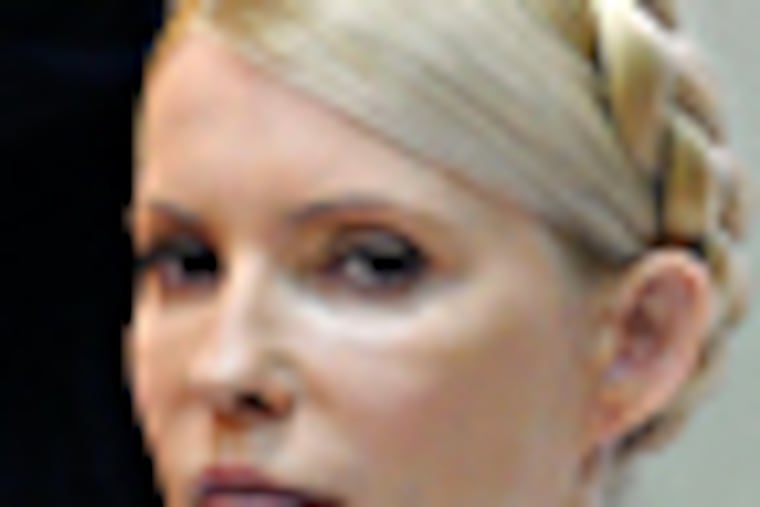Ex-premier ends hunger strike
Ukraine's Tymoshenko was moved from jail to a hospital for treatment of her back condition.

KHARKIV, Ukraine - Yulia Tymoshenko ended a nearly three-week-long hunger strike Wednesday as the imprisoned former Ukrainian prime minister was moved from jail to a hospital for treatment of a severe back condition under the supervision of a German doctor.
The news was likely to allay at least some Western concerns over Tymoshenko's health and handling in prison.
EU officials and some governments from the 27-nation bloc have vowed to boycott the European Championship soccer tournament, which begins in June and is cohosted by Ukraine and Poland. Ukraine had to cancel a regional cooperation summit this weekend after most heads of central and eastern European states canceled their visits because of the Tymoshenko case. Brussels also suggested Wednesday that Ukraine's prime minister was not welcome at an event he planned to attend next week.
Tymoshenko, 51, the country's top opposition leader, had been on a hunger strike since April 27 to protest alleged abuse. Ukraine's government has come under intense Western pressure to provide Tymoshenko with suitable medical care.
Deputy Health Minister Raisa Moiseyenko said Tymoshenko was moved from her prison in Kharkiv to a local clinic Wednesday morning. Lutz Harms, a neurologist with Berlin's Charite clinic, will supervise her treatment at the hospital because Tymoshenko doesn't trust government-controlled doctors.
Harms told the Channel 5 television channel that Tymoshenko had ended her hunger strike and was slowly returning to a normal diet. He said she would first take only water and juice and then gradually add solid foods.
Tymoshenko was sentenced in October to seven years in prison on charges of abuse of office while conducting natural-gas import negotiations with Russia in 2009. The West has condemned the verdict as politically motivated and has piled pressure on Ukraine to free her and end the alleged mistreatment.
Brussels and Washington have long pushed President Viktor Yanukovych to free Tymoshenko, but photos of bruises on her body that appear to corroborate her claim that she was beaten by prison officials shocked the West and led to vows to boycott the soccer matches.
Poland's president appealed Wednesday to Ukraine's leaders to change what he called anachronistic laws that have allowed the imprisonment of Tymoshenko and others on political grounds.
"These regulations, born under a previous system and until today still unchanged by Ukrainian democrats, are the source of bad temptations and bad decisions," Bronislaw Komorowski said in Warsaw.
But Komorowski also stressed that Poland does not support a boycott of Ukraine.
"I want to clearly speak against a boycott of Ukraine and against a boycott of Euro 2012 games in Ukraine. We are co-organizers and cohosts of the championships," Komorowski said. "A political struggle should not ruin our joint Polish-Ukrainian sports celebration and the Polish-Ukrainian undertaking that was intended to be, and should be, a help for Ukraine on its path toward European integration."